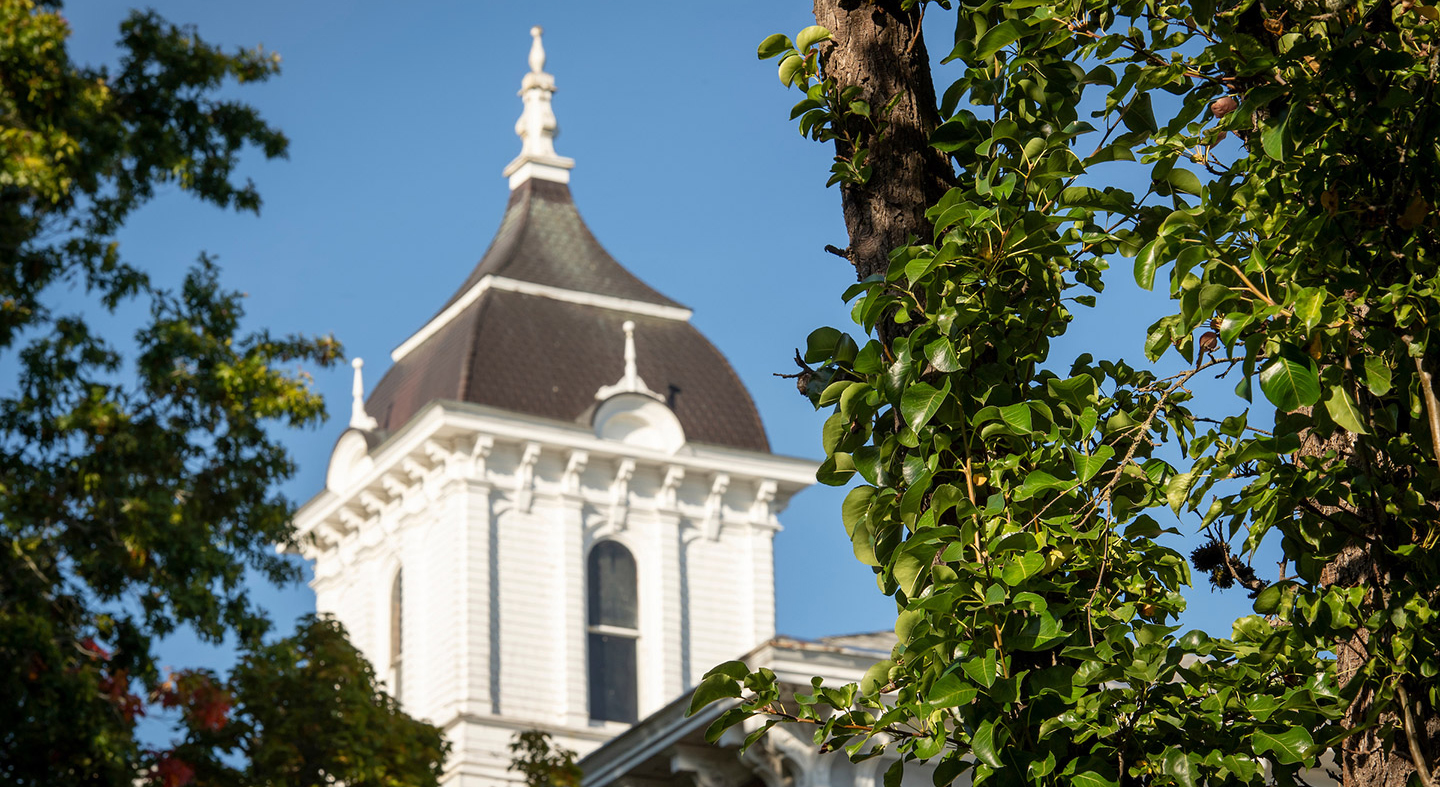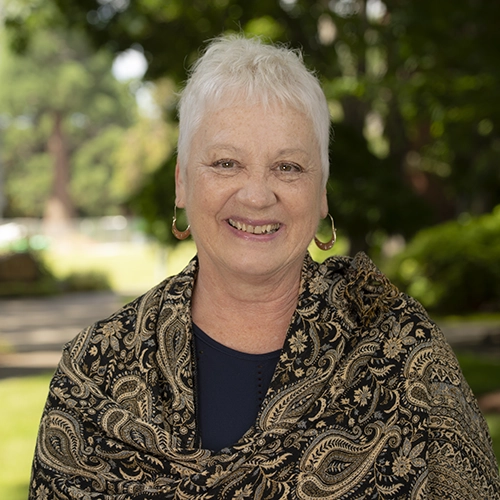
Clearing the lens



“Monumental events only appear to be momentous in hindsight.”
This was one of the points made by Dr. Dawn Nowacki in her funny, moving summing up of her career, an event reviving a Linfield tradition known as “last lecture.” She spoke fondly, but frankly, of her years studying Russia, and studying IN Russia.
“Geography matters. We feel distanced here in Oregon, and irrelevant, but we are as affected here in Oregon as anywhere in the world, by a very complex set of global forces and conditions,” Nowacki told an audience of more than 100 — current and past students and faculty, as well as friends and family — in a talk she called “Confessions of a Cold War Scholar” at Nicholson Library at Linfield University on May 8. She is retiring this week after 30 years with Linfield’s political science department.
"Some of my students think I’m a spy,” joked Nowacki (know-VA-ski). a lifelong scholar who once failed a lie detector test in applying for a job with the National Security Agency. This was years after stints in Leningrad (now St. Petersburg) as a undergrad in the 1970s — when it was rare for American college students to live in Russia, and before her post-graduate work in the 1980s. Four decades ago Nowacki saw the Russian economy fail and witnessed the early stages of Perestroika — “restructuring” — that led to the breakup of the Soviet Union. She did her undergraduate and master’s work in Russian Studies and international education at University of Washington, and earned her political science doctorate at Emory College, and was awarded a Fulbright Teaching Fellowship for Russia in 2001.
The lie detector results were not what blew her chances at the NSA job. There’s great irony in the reason: “too much unsupervised time in U.S.S.R.,” said Nowacki. “That means, unsupervised by the U.S. government.”
Nowacki said, “I spent the first half of my life in Cold War,” which she described as “a bipolar phenomenon, not in the same way as a psychological analysis of a person,” but a world defined by the rivalry between the U.S. and the Soviet Union. “Other countries were forced to choose sides. It was very black and white,” she said, “compared to the multi-polar conditions that led to World War I and could lead, to World War III. I hope not.”
Now, after years of teaching, traveling, and learning, she has much to pass on to others — though not all of her wisdom is political.
“What you have to say is more important than what you are wearing,” Nowacki said, “I don’t care what people think of me. I’m an old woman.”
“You can conquer anxiety,” said Nowacki. She referred to two sets of fears she overcame, including public speaking — “believe or not at one time I was terrified of speaking in front of a group.”
The other was at the start of her job as a translator on a Russian fishing vessel in the north Pacific. Nowacki had been asked about the most frightening thing she ever experienced. She described, c. early 1980s, disembarking from her transport boat onto a far larger Russian fishing ship, traversing the waves on a rope ladder stretched between the two vessels.
“Chance favors the prepared mind,” was another pearl from Nowacki. “If you have some chance, take it.”
Debbie Harmon Ferry, Linfield’s director of Alumni and Parent Engagement, spoke first at the event, noting that the “last lecture” was a long tradition at Linfield that faded a few years back and Nowacki’s departure was a good opportunity to revive the opportunity for academics to have their final say. (On May 8, however, she stressed that “Dr. Nowacki is not done teaching – she still has classes and her students will still hear from her” while also leaving open the possibility that Nowacki might guest-teach after retirement.)
Political Science Department Chair Patrick Cottrell introduced Nowacki at the last lecture as “a stellar teacher” with “an incredible breadth of knowledge and interests” and “the humility to know that learning is a mutual exercise.”
Nowacki blended professional observations — “Russian imperialism was never gone — we just stopped seeing it” — with personal ones — “It is really weird to get to this point,” she said of retirement. “For a long time I thought I wasn’t ready … ‘who am I going to be if I’m not there teaching?’
“This has been so fulfilling, I am so lucky,” she said. “I’ve had incredible opportunities, experiences and people I’ve come to know.”
Her awareness of world politics and other cultures started when she was young. She said that growing up in the 1960s she saw a “sense of renewal,” in the civil rights and feminist movements.
“My sixth grade teacher taught me about politics and (the school) took it very seriously. Do they do that anymore?”
She read Alexander Solzhenitsyn’s “The Gulag Archipelago” at age 15, saying “I was bit by the bug.” She studied German and later Russian, which she claims never to have mastered.
At various times in her life, including recently, she has re-assessed her perspective — looking at the Cuban missile crisis forced her to ask, “why do they hate us?
“I started feeling empathy, curiosity about why things are the way they are.” She said that after 9-11, she asked the same question: “Why do they hate us?”
As a young woman she worked in Paris for Radio Liberty, which wanted to know “Who’s listening?” beyond the Iron Curtain, and “how do you do that in a closed country?” She and others learned what they could by interviewing the many Jewish émigrés expelled in the late 1970s from Russia, first to Vienna or Rome; from this they deduced that 15 percent of the Russian populace was listening to their broadcasts, “though we were very much jammed.”
Her lifelong interest in Russia has not waned with current events, but intensified them in new ways.
“I’m pissed at them now — not all of them. The government. I am a dove, but I am a hawk on Ukraine.”
Recent years have shown her new ways of looking at Russia; she learned about its history through the lens of 19th century Russia, that Russia was the supposed logical outcome of the historic Kyvan Rus, and other “crap” purveyed by Putin, who himself was a law student walking the same Leningrad university hallways.
“I see things through a Russian lens, and it’s not accurate,” she admits
Toward the end of the lecture, Linfield music professor Anton Belov, who grew up in Ukraine, spoke of listening at age 13-14, to Radio Free Europe and BBC on a secret short-wave radio.
“I got to listening to all of your propaganda, and it was nice, so thank you very much,” Belov said. Yet Nowacki deflected, saying, “I didn’t broadcast, I just did the research.”
Reprinted with permission of the News-Register. Originally published May 24, 2024.